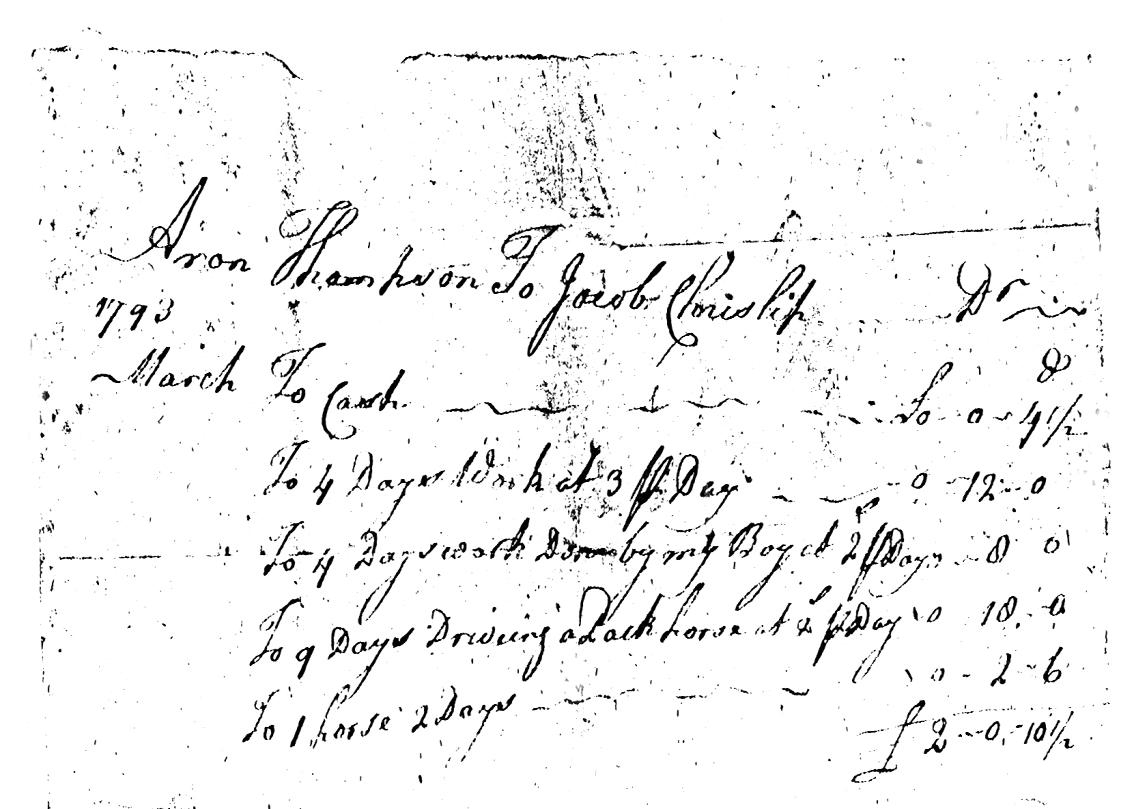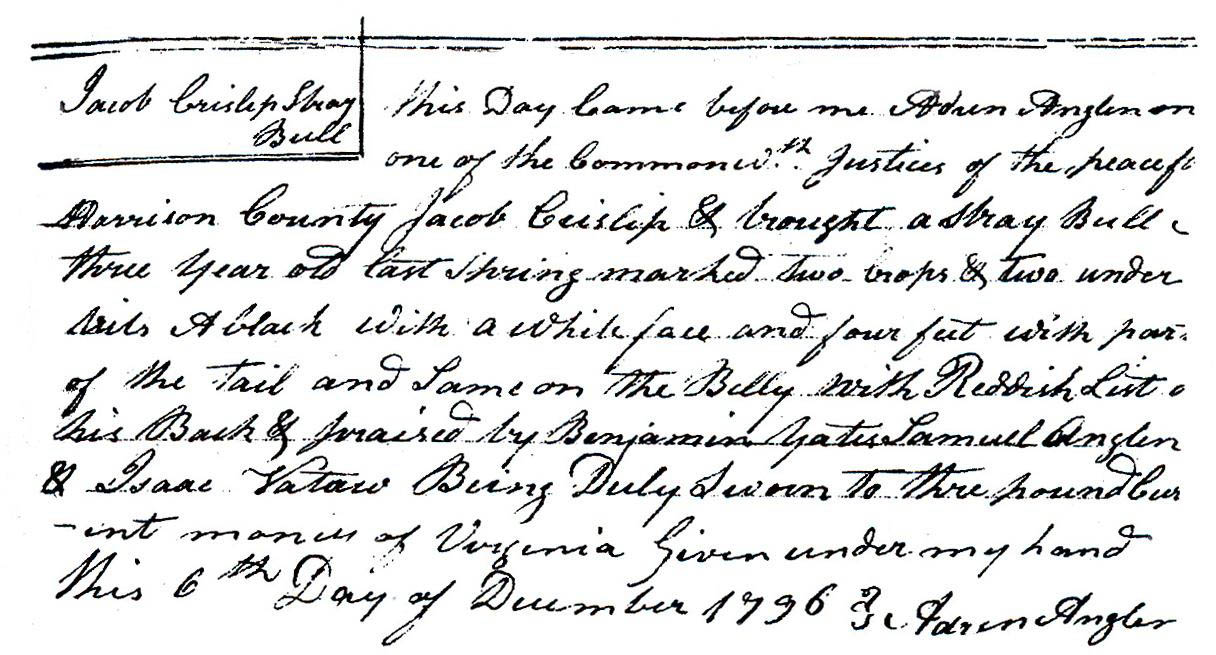Hampshire County to Harrison County
In the 1780s, interior roads in the region of Berkeley and Hampshire counties were limited to old Indian trails. In all probability, they traveled by horse with their few worldly goods carried by pack horses. They probably walked a good share of the distance to their new location.
In order to get to Harrison County, Jacob and his family had to take one of four mountain gaps that run through the half-mile high Mill Creek Mountain, a continuous mountain ridge that runs northeast through Hampshire and Hardy counties. Although there are three other gaps or passes through Mill Creek Mountain, the one at Pearsall’s Flats connected with a trail that led directly to Clarksburg and beyond. Located at present-day Romney, in Hampshire County, Pearsall’s Flats was settled in 1725 by hunters and traders. Chartered December 23, 1762, Romney has the distinction of being West Virginia's oldest town.
Jacob’s trek westward probably terminated at a settlement some twenty miles east of Clarksburg, a place that eventually became Grafton. That settlement was part of a rapid movement west to the new frontier in the early- to mid-1700s. James Current, an Irish immigrant, who had entered the continent by way of Maryland, traded a horse for 1300 acres of virgin land in Virginia situated where the City of Grafton is today. On today’s modern highways, the distance from Romney to that 18th-century settlement is about 87 miles. State Route 50 follows the road taken by Jacob 228 years ago.
From James Current’s acreage, which had been surveyed by George Washington, Jacob and family journeyed twenty miles to the south where he settled in the vicinity of Elk Creek in Harrison County. Seven years later, in 1799, he would acquire 300 acres of land via patent issued from Richmond.
Thirty years would elapse from the time he left Cumberland County, Pennsylvania, to his return for a brief visit ca. 1812. By that time roads had improved, but not to the extent of the Cumberland Road, which was in its infancy. Also known as the National Road, it was the first major improved highway to be built by the federal government. Begun in 1811 at Cumberland, Maryland, it crossed the Allegheny Mountains and southwestern Pennsylvania, reaching Wheeling in 1818. In years following, the Cumberland Road would have made for easier communication between the families of Carl in Pennsylvania and of Jacob in Virginia. A significant part of today’s U.S. 40 follows the path of the old Cumberland Road.
During the years prior to settling in Harrison County, four more children were born to Jacob and Nancy: Catherine in 1786; Jacob II, in 1787; John in 1789; and Nancy in 1790. The remaining six of their fourteen children were born in Harrison County: William in 1794; Abram in 1795; twins Isaac and Margaret in 1797; Samuel in 1800; and Sarah in 1802.
Jacob and Nancy’s seven sons and seven daughters were born over a span of 22 years. During those years, a new nation had been born and there had been three presidencies—George Washington, John Adams, and Thomas Jefferson.
Back to Top
Harrison County Court Records
A court record shows that, in March of 1793, Jacob hired Aron [Aaron] Thompson’s services as a laborer for several days. According to the statement, the work included 4 days work at 3 shillings per day, totaling 12 shillings; 4 days for work “done by my Boy at 2 shillings, 25 pence” totaling 9 shillings; 9 days driving a pack horse at a cost of 19 shillings; and the services of one horse for two days’ work at a cost of 2 shillings, 6 pence. Also included was an item “To cash” in the amount of 4 ½ pence.
For whatever reason, Jacob had not paid Aaron Thompson for his labors. The total amount owed by Jacob, as seen in the document below, was £2 − 0 − 10½ (2 pounds, 10½ pence). After waiting nearly three months to be paid, Aaron Thompson grew impatient with Jacob. He petitioned the court for assistance, as seen as follows:
“To the Worshipful Court of Harrison County. The Petition of Hon. Thompson humbly sheweth that Jacob Christlieb stands indebted to him the sum of Three Pounds, Ten Shillings, by amount and refuseth payment. Whereas Your Petition passes Judgment for the same with costs and shall pay them.” File: West Virginia Collection, Morgantown, West Virginia.
It is not clear how the 2 pounds, 10½ pence statement figured into the case or if it was related to it at all. It may be that Aron Thompson submitted more than one statement to Jacob. Whatever the case, it is clear that Jacob was unwilling, or unable, to make full payment to Thompson.
On June 4, 1793, Jacob received a summons to “appear before the Justices of our said county at the Courthouse on the Third Monday July – next to testify and the truth to lay in behalf of Aron Thompson in a suit now defending before our said Court. . . .” The court also summoned William Thompson “to appear before the Justices of our said County court at the Courthouse on the third Monday in this Present Month to testify and the truth to saying behalf of Aron [sic] Thompson against Jacob Cristlip. . . .”
Being aware that two witnesses had been summoned on behalf of Aaron Thompson, Jacob appeared at the court in July, where he paid his debt. The case was settled without trial. The case was filed as a “non-suit” for March Term, 1793. Harrison County Minute Book, 1797-1799.
As a newcomer to the area, it seems odd that Jacob would risk his reputation by refusing to pay a debt. The situation suggests that Jacob may have had a valid reason for not paying Aaron Thompson. Perhaps Thompson left the work unfinished or his work was not up to Jacob’s standards. Whatever the case, Jacob paid his debt and went on with his life.
The aforementioned document was recorded on December 6, 1793, by Justice of the Peace Adren Anglin. In it Jacob requested ownership of a three-year-old bull that had strayed onto his property. Harrison County Strays Book.
The entry in the Strays Book leads one to believe that Jacob was familiar with the animal and that it had been a frequent visitor on his property. To back up his claim, witnesses, Benjamin Yates, Samuel Anglin and Isaac Vataw were sworn to “three pounds, current money of Virginia.” In the absence of fences, it was the owner’s responsibility to keep track of his livestock. If an animal strayed, it was the prerogative of the owner of the land, on which the animal strayed, to claim it as his own, especially if the animal was a frequent visitor.
The Harrison County Minute book shows that Jacob Chrisliff brought suit against Joshua Clark on June 21, 1796. The suit was for non-payment of 159 cents due him for appearing as a witness on Clark’s behalf, when he filed a suit against Benjamin Whitson the previous April. The case reveals that Clark had hired a team of steers from Whitson that would not plow, declaring that “. . . one of them was unruly.” After Clark won the suit, he neglected to give Jacob his due. Commonwealth of Virginia, Harrison County Minute Book 1792-1797, p. 374.
Four years after Aaron Thompson had brought suit against Jacob, Thompson made another complaint against him on June 4, 1797. In the summons shown below, Jacob Christlif was summoned “to appear before the Justices of our said County Court of Harrison on the Third Monday in July next to answer Aron Thompson of the plea of Debt Exhibition . . .” Details involving Jacob’s second dispute with Thompson remain unknown.
The peculiar spellings Chrisliff and Christlif, as set down by Court Clerks and the aforementioned Chrislop, are but a few of the variations that appear in various historical documents pertaining to Jacob.
It should be mentioned that, aside from Jacob whose surname appears in a myriad of spellings—Christlip, Christleb, Chrisleb, Christlib, Chrislib, Crislib, Chrislif, Chrisliff, Crislip, Chrislip Christlieb—his progeny were recorded almost without exception in Harrison County with the spelling, Crislip. After Barbour County was formed in 1843, record keepers in that county favored the spelling, Chrislip.





